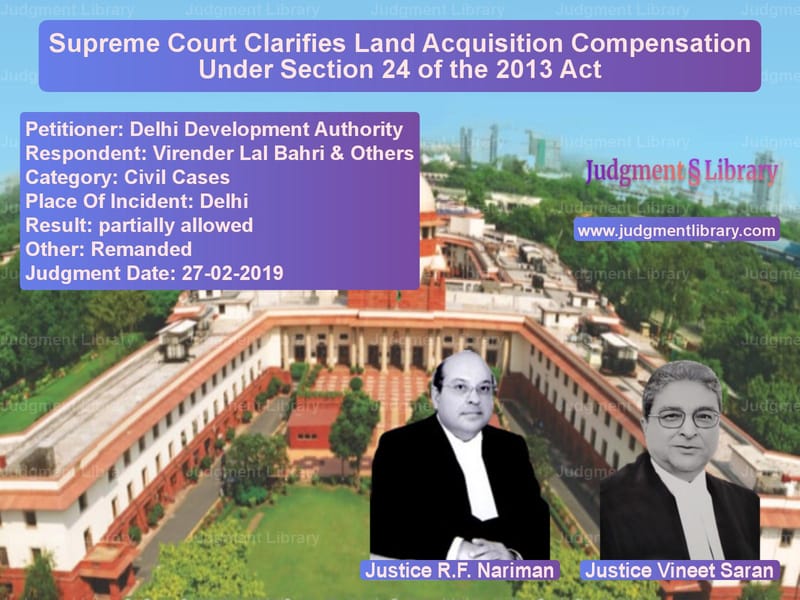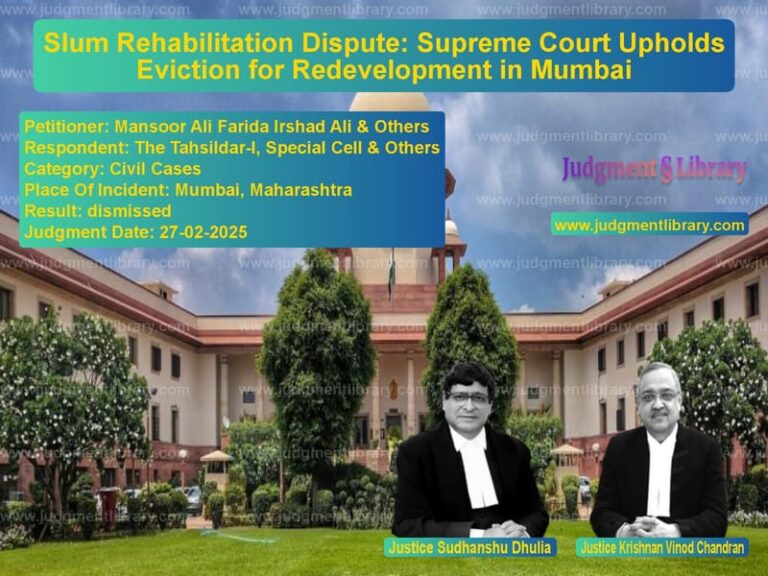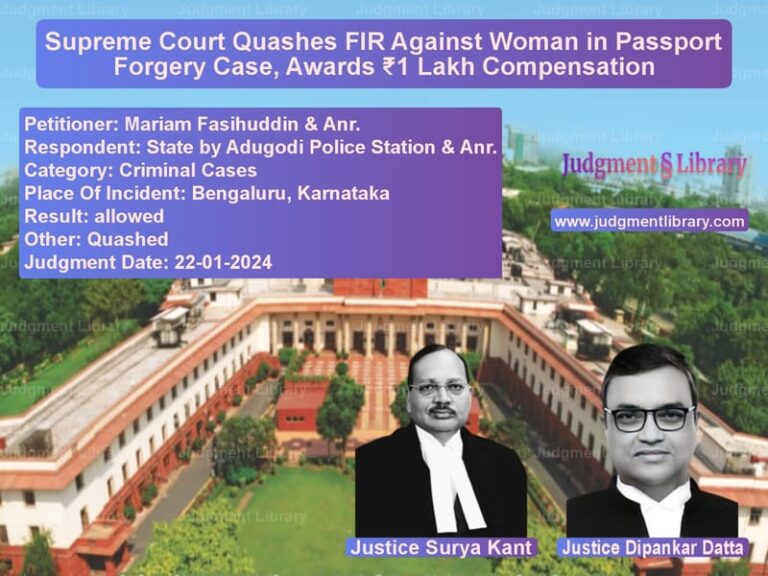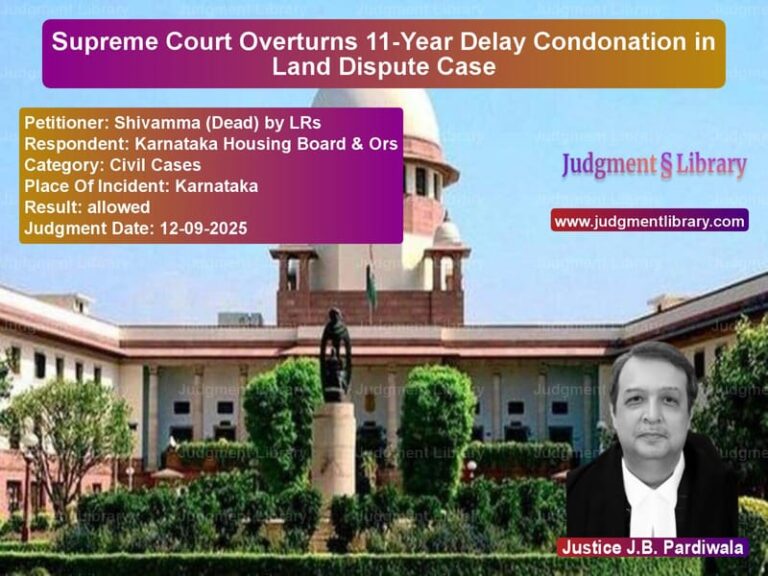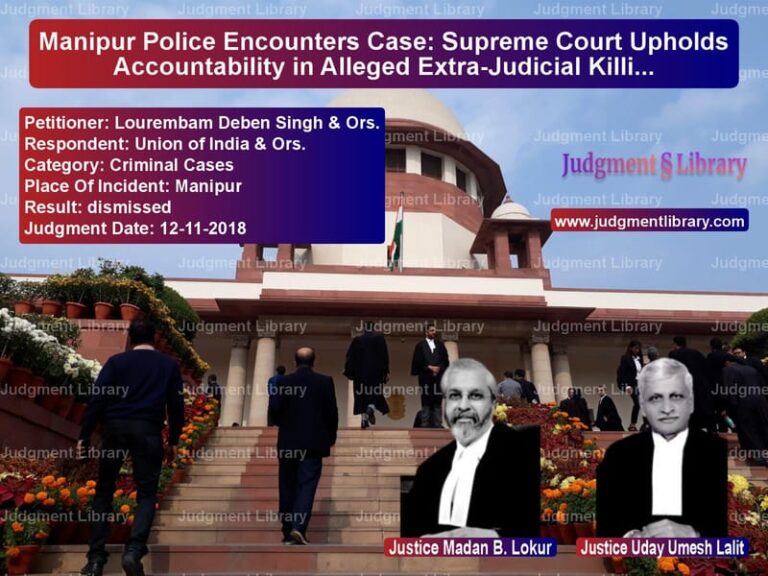Supreme Court Clarifies Land Acquisition Compensation Under Section 24 of the 2013 Act
The Supreme Court of India recently delivered a significant ruling in the case of Delhi Development Authority vs. Virender Lal Bahri & Others, addressing a long-standing legal dispute regarding land acquisition and compensation under the Right to Fair Compensation and Transparency in Land Acquisition, Rehabilitation and Resettlement Act, 2013 (2013 Act). The judgment resolves conflicting interpretations of Section 24, particularly regarding the applicability of its proviso and whether land acquisition proceedings lapse due to non-payment of compensation.
Background of the Case
The case concerns land acquired by the Delhi Development Authority (DDA) under the Land Acquisition Act, 1894. The dispute arose over whether the compensation owed to landowners had been properly deposited and whether the acquisition should be considered lapsed under Section 24(2) of the 2013 Act.
The Punjab and Haryana High Court, in a similar case (Tarun Pal Singh v. Lieutenant Governor, Government of NCT of Delhi), had ruled that if compensation was not deposited for the majority of landowners, then all landowners in the acquisition process would be entitled to compensation under the 2013 Act. This ruling created confusion regarding whether land acquisitions should be considered void if compensation was not paid or deposited in government accounts.
Challenging this decision, the DDA appealed before the Supreme Court, arguing that the proviso to Section 24 of the 2013 Act should not be interpreted in a manner that automatically invalidates long-standing acquisitions.
Key Legal Issues Considered
- Does the proviso to Section 24 of the 2013 Act apply to Section 24(1)(b), which allows pending land acquisitions to continue, or to Section 24(2), which provides for the lapse of acquisitions if compensation is not paid?
- Can landowners demand compensation under the new law if the majority of them have not received compensation under the previous law?
- What impact does the ruling have on land acquisition projects across India?
Arguments by the Petitioner (DDA)
The DDA argued that:
- The proviso to Section 24 was meant to apply to Section 24(1)(b), ensuring that pending acquisitions could proceed with fair compensation, not to Section 24(2), which deals with lapsing of acquisitions.
- If the High Court’s interpretation was upheld, it would set a precedent leading to the automatic lapse of thousands of land acquisitions, causing major disruptions in urban planning and development projects.
- Compensation had already been tendered and deposited in most cases, and minor procedural delays should not result in the lapsing of acquisitions.
Arguments by the Respondents (Landowners)
The landowners, on the other hand, contended that:
- The government had failed to pay compensation in a timely manner, which should automatically render the acquisition invalid.
- The intent of the 2013 Act was to protect landowners from prolonged acquisition proceedings where compensation was either inadequate or undelivered.
- The proviso should be read in favor of landowners, allowing them to receive higher compensation under the new law.
Supreme Court’s Analysis and Judgment
The Supreme Court considered previous rulings on similar cases, including:
- Delhi Metro Rail Corporation v. Tarun Pal Singh (2018) – This case dealt with the applicability of the 2013 Act in ongoing acquisitions.
- DDA v. Sukhbir Singh (2016) – Emphasized that non-payment of compensation should not lead to automatic lapses in acquisitions.
- Indore Development Authority v. Shailendra (2018) – Addressed the scope of Section 24 and was referred to a larger Bench.
The Supreme Court ruled:
“The proviso to Section 24 applies to Section 24(1)(b) and not to Section 24(2). The legislative intent was to ensure fair compensation without automatically lapsing acquisitions.”
The Court further held:
- Land acquisition proceedings do not automatically lapse due to minor delays in compensation payment.
- The proviso to Section 24 of the 2013 Act is intended to ensure that compensation is provided fairly, but it does not mean that landowners can demand a new round of compensation under the revised Act.
- The case was referred to a Constitution Bench for further examination of broader issues related to land acquisition.
Impact and Significance of the Judgment
This ruling has far-reaching implications for land acquisition disputes across India:
- Clarity on Section 24: The decision settles confusion over whether compensation delays result in lapses of land acquisition.
- Prevention of Automatic Lapse: Government authorities and developers can proceed with land acquisitions without fearing immediate lapses due to compensation technicalities.
- Protection of Landowners’ Rights: The ruling ensures that landowners receive fair compensation, even if previous payments were delayed.
- Reference to Larger Bench: The Supreme Court has referred the issue for further examination, ensuring a more comprehensive resolution in the future.
Conclusion
The Supreme Court’s ruling in DDA vs. Virender Lal Bahri clarifies a critical legal question regarding land acquisition under the 2013 Act. By affirming that the proviso to Section 24 applies to Section 24(1)(b), the Court has ensured continuity in land acquisition processes while safeguarding landowners’ rights to fair compensation. The decision prevents undue disruptions in land acquisition projects while ensuring that procedural delays do not result in unfair losses for landowners.
Petitioner Name: Delhi Development Authority.Respondent Name: Virender Lal Bahri & Others.Judgment By: Justice R.F. Nariman, Justice Vineet Saran.Place Of Incident: Delhi.Judgment Date: 27-02-2019.
Don’t miss out on the full details! Download the complete judgment in PDF format below and gain valuable insights instantly!
Download Judgment: Delhi Development Au vs Virender Lal Bahri & Supreme Court of India Judgment Dated 27-02-2019.pdf
Direct Downlaod Judgment: Direct downlaod this Judgment
See all petitions in Property Disputes
See all petitions in Damages and Compensation
See all petitions in Judgment by Rohinton Fali Nariman
See all petitions in Judgment by Vineet Saran
See all petitions in partially allowed
See all petitions in Remanded
See all petitions in supreme court of India judgments February 2019
See all petitions in 2019 judgments
See all posts in Civil Cases Category
See all allowed petitions in Civil Cases Category
See all Dismissed petitions in Civil Cases Category
See all partially allowed petitions in Civil Cases Category

